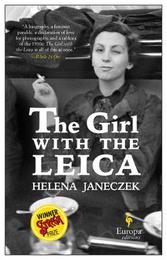
|
The Girl with the Leica
Paperback / softback
Main Details
| Title |
The Girl with the Leica
|
| Authors and Contributors |
By (author) Helena Janeczek
|
|
Translated by Ann Goldstein
|
| Physical Properties |
| Format:Paperback / softback | | Pages:364 | | Dimensions(mm): Height 203,Width 127 |
|
| ISBN/Barcode |
9781609455477
|
| Classifications | Dewey:853.92 |
|---|
| Audience | |
|---|
|
Publishing Details |
| Publisher |
Europa Editions
|
| Imprint |
Europa Editions
|
| Publication Date |
8 October 2019 |
| Publication Country |
United States
|
Description
The Girl with the Leica is a must-read for fans of historical fiction centered on extraordinary women's lives.' Gerda Taro was a German-Jewish war photographer, anti-fascist activist, artist and innovator who, together with her partner, the Hungarian Endre Friedmann, was one half of the alias Robert Capa, widely considered to be the twentieth century's greatest war and political photographer. She was killed while documenting the Spanish Civil War and tragically became the first female photojournalist to be killed on a battlefield. August 1, 1937, Paris. Taro's twenty-seventh birthday, and her funeral. Friedmann, who would henceforth assume the moniker Robert Capa alone, leads the procession. He taught Taro to use a Leica. Together, they left for the Spanish Civil War to bear witness to fascist war crimes. He is devastated, but there are others, equally bereft, in the procession: Ruth Cerf, Taro's old friend from Leipzig with whom she fled to Paris; Willy Chardack, ex-lover; Georg Kuritzkes, another lover and a key figure in the International Brigades. They have all known a different Gerda, and one who is at times radically at odds with the heroic anti-fascist figure who is being mourned by the multitudes. Gerda Taro is at the heart of this kaleidoscopic novel but another of its main characters is the era itself, the 1930s, with economic depression, the rise of Nazism, hostility towards refugees in France, the century's ideological warfare, the cultural ferment, and the ascendency of photography as the age's quintessential art form. 'Helena Janeczek brings into focus a world of young artists, photographers, and 'intellectual refugees' caught in the storm of 20th-century history, between one war and the other. Still, her prodigious characters remain capable of happiness, vital, and 'free from everything'. Janeczek's novel perfectly reproduces their sparkling passions.' - Vanity Fair
Author Biography
Born in Munich in a Polish Jewish family, Helena Janeczek has been living in Italy for over thirty years. With The Girl with the Leica she has won the Strega Prize, Italy's most prestigious literary award, and was a finalist for the Campiello Prize. Ann Goldstein has translated into English all of Elena Ferrante's books, including each of the New York Times bestselling installments in Ferrante's Neapolitan quartet, the fourth of which, The Story of the Lost Child, was shortlisted for the MAN Booker International Prize. She has been honored with a Guggenheim Fellowship and is a recipient of the PEN Renato Poggioli Translation Award. She lives in New York.
ReviewsPraise for The Girl with the Leica "Exceptionally intricate...Janeczek's demanding, allusion-saturated, multiperspective novel portrays a circle of valiant dissidents."--Booklist (Starred Review) "A daring attempt to capture the life of a revolutionary woman."--The Guardian "This mosaic of vignettes and images brings a complex courageous woman back into focus."--BBC Culture "Fans of historical fiction featuring strong, forward-thinking female characters will be enthralled."--Publishers Weekly "A biography; a feminist parable; a declaration of love for photography; a narrative tableau of the 1930s: The Girl with the Leica is all of this at once. Helena Janeczek worked on this book for six years. And it shows." --Il Sole 24 Ore "Helena Janeczek [ . . .] is Italy's most eclectic writer. While attentive to the narrative, she's obsessed with historical reality: The Girl with the Leica is her most beautiful book yet. In fact, each new book seems to surpass the previous one - until you realise that they are all part of the same encyclopaedia of the human experience." --L'Espresso "In The Girl with the Leica Helena Janeczek brings into focus a world of young artists, photographers, and 'intellectual refugees' caught in the storm of 20th-century history, between one war and the other. Still, her prodigious characters remain capable of happiness, vital, and 'free from everything'. Janeczek's novel perfectly reproduces their sparkling passions." --Vanity Fair "In the novel, Gerda [Taro] comes to life in the recollection of three friends who loved her. She's vital, brave, elusive yet unforgettable. The irresistible fascination she exerted on her contemporaries retains all its power today.' --Internazionale "A story of bravery and determination that leaves us breathless and with a sense of emptiness, as if we have known [Gerda Taro] personally." --Repubblica
|